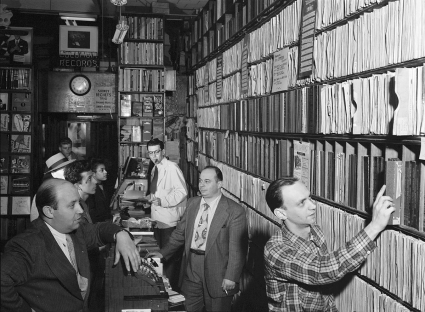.
.
photo by William Gottlieb/Library of Congress

Milt Gabler, Herbie Hill, Lou Blum, and Jack Crystal, Commodore Record Shop, New York, N.Y., ca. Aug. 1947
.
.
___
.
.
.Abandoned But Not Forgotten
One of my greatest joys for decades
was exploring unknown record shops.
I once walked into a newly opened used
shop around the corner from my university
and discovered a used album, apparently
the improvisatory result of a session
set up by Norman Granz that included
Clark Terry, Dizzy Gillespie, Freddie
Hubbard, Oscar Peterson, Joe Pass,
Ray Brown, and Bobby Durham.
The album contained two (or maybe
three, I don’t remember) LPs
that I played for years until I moved
abroad and gave the album away.
The store had a wonderful selection
of jazz, but closed within the year
which I found heartbreaking.
In Tallinn, Estonia, I was walking
down city streets in the middle
of a blinding snowstorm, stepped
into a small building that had several
small businesses in it, in order
to figure out where I was and how
to get back home, and found I was
standing next to a record shop
that carried new and used CDs,
all of which were jazz. I left there
with albums by Lee Morgan, Miles Davis
(from his later years), “A Love Supreme,”
“My Favorite Things,” “Tokyo Blues,”
Milt Jackson, Sun Ra, and half a dozen
other albums. Over the next six months,
I returned there every couple of weeks.
Who would have thought such a shop
would be in the middle of a small building
in Estonia, and that I would find it in the middle
of a Sunday snowstorm? The old guy running
the shop knew more about jazz than most
musicians, and always seemed to have
whatever I (or anyone else) was searching for.
There was a little cassette tape shop in Abu Dhabi
that sold rip off copies of rock, jazz, blues, reggae,
classical, bluegrass, Celtic, and American folk music.
Such rip off shops were common throughout Abu Dhabi
in 1992, but this was the only place that seemed to have
whatever music one might desire. The little Syrian
proprietor seemed to be familiar with, and able to discuss,
virtually any type of music, and do so in Arabic, English,
French, Spanish, German, and Italian. He gave new meaning
to music being a universal language. He loved Jimi Hendrix,
Shania Twain, The Chieftains, Doc Watson, Bob Dylan,
Mozart, Bach, autoharp music, Bob Marley, Leadbelly,
and a host of other disparate musical artists.
In the not so distant past, there were such shops in London,
Los Angeles, Tallinn, Abu Dhabi, Amsterdam, Portland, Kuwait City,
and other cities in other countries around the world. Most of them
have faded into time, like a Bill Evans solo, or the final notes
sung of a Woody Guthrie song by Cisco Houston. Time swallows all.
Yet there are a few of us who still remember, and as long as
we remember, the musicians and record shops will hang in the air,
a slowly dissipating mist containing whispers of what once was
in the wisps of times past that ferry lost notes, fading voices,
and dreams of an unachievable future that wrap us round
in a quietly joyous melancholy that warms and elicits tears.
.
by Michael L. Newell
.
___
.
Vinyl
When I moved into this new apartment, this new city,
………………10 years ago to the day,
A primary task was to alphabetize my vinyl.
………………I’d collected since the 70’s,
Even before., I’d owned a couple of Beatles or Beach Boys
………………dating from the 60’s’, but the
First Dizzy album I’d heard was an old Everest reissue,
………………sessions from ’45 & ‘46,
Pure frantic bebop, Blue ‘N’ Boogie, Dizzy Atmosphere,
………………All the Things You Are…
Didn’t need to understand, it resonated,
………………from the ears to the gut to the spirit, in
Ways never heard before. Murray Shipinsky humming into his bass,
………………like Slam Stewart & Major Holley would do later,
& Slim & Slam were the coolest, the voutiest,
………………even noted by Kerouac, in On the Road.
I’d lost the order of the records a while ago,
………………and since there’s so much music available,
I need now to make the time for my 1200+ vinyl.
………………Now I pick albums at random, still know the lyrics to Déjà Vu,
Still have the guilty pleasure of Manilow, but sometimes there are Gems:
………………Ella & Basie, the remarkable April in Paris, “one more once,”
Scatting with Joe, the classic ’56 Band.. Blue Notes from ’57, Dizzy Pablos
………………from ’79, live albums of concerts I’d heard…So much great jazz
I’m scheduled for the Jazz Cruise in January, oceans of jazz awaiting;
………………but I’ve got my vinyl, my personal musical history;
Piles of hidden treasures, especially aware of the so many who’ve passed;
………………the music at my fingertips. Classic American music: jazz.
.
By Phil Linz
.
___
.
Blog Project
Hank Williams and Liberace
Swam all week in the back of my car
In the plastic avalanche
That flowed down
…..From the back seat
To the cargo door
Along with The Best of Bread
…..Which soundtracks Ernie’s personal
On the road tale
and, a few jazz jewels
It’s hard not to imagine
A blog project
Out of this mass of ancient vinyl
Old LPs- scraped, moldy,
Coverless at times-
Given to me as a belated birthday gift
The earliest rescued gem-
A clean copy of Sgt. Pepper
…..Cut outs insert intact
“After all these years”
And, possibly
A few salvageable Emmy Lou Harris’s
Among the detritus
Of someone else’s attachment
To Long Players
That were about to be commissioned
To the local transfer station, at best
Instead bear testimony
That every album cover
Tells a story
Don’t it?
.
.
_____
.
.
Michael L. Newell has had six books published in the past three years: Meditation of an Old Man Standing on a Bridge; Each Step a Discovery; Wandering; Diddley-Bop-She-Bop; Making My Peace; and The Harry Poems (newly published). He currently lives in Florida.
.
.
___
.
.

Phil Linz was born in Brooklyn, NY and has lived in several cities across the United States. He began writing poetry in 1971 and is founder and publisher of Fierce Grace Press, which specializes in chapbooks, believing in the concept of “Publishing Under the Radar.”.His new book, The Chapbooks: Collected Poems, is available on Amazon. He currently lives in Wilmington, DE, and can be reached at [email protected].
.
.
___
.
.
photo by Alice Mello

Jim Mello is a counselor and clinical supervisor in the substance use disorder field. He’s also a part time clergy person, and has taught in the University of Maine system as an adjunct professor. Besides People, .his passion is music and he.became a poet by default. He has three books published, two by Moon Pie Press, and one self-published.
.
.
Listen to the 1960 recording of King Pleasure performing “Golden Days” [Hi Fi/Everest]
.
.
.





























The poems of Mr. Linz and Mr. Mello resonate with me and evoke powerful memories. Fine work, gentlemen.